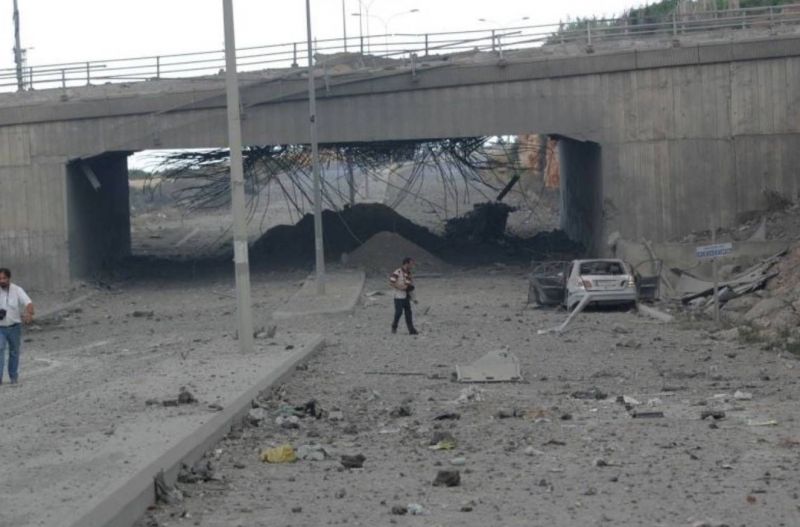
A collapsed bridge in Rmeyleh near Saida, July 2006. (Credit: Ahmad Mantache)
“I’m terrified,” says Fatima, a resident of Minyeh, near Tripoli. She fears “Lebanon is going to be dragged into a new war.” The day after Hamas launched its surprise offensive against Israeli territory on Saturday morning, Hezbollah claimed responsibility for several rockets fired toward the country’s north. Hezbollah’s provocation prompted an immediate response from Israel, which fired towards southern Lebanon. In the South, opinions range between the fear of military escalation to the desire to put the unrest into perspective, which until now has been focused on the Gaza Strip.
For some, the fear of reliving the nightmares of war is vivid. “I’m afraid that the 2006 war would be nothing compared to what’s coming. I’m afraid that Hezbollah would drag us into it again,” says Fatima. In July 2006, the Iran-aligned party captured two Israeli soldiers and opened a second battle front against Israel. This came as the latter carried out a large-scale military operation against Hamas in Gaza. The response turned Lebanon into a battlefield. “This time, there will be Iran, Syria, the United States, Russia... It will be a global war,” Fatima says.
‘We’re waiting’
Siham*, a middle-aged woman from the Chouf, speaks with a shaking voice over the phone. She wonders how Lebanon could cope with such a scenario while the country continues to suffer the from the economic crisis that has been raging since 2019. “We’re already in a bad state, we can’t have another war,” she said.
“We’re waiting,” says Issam al-Hage, a man from Rmaish, a village just two kilometers away from the southern border. “For the moment, nobody has decided to leave. But like all the villages on the front line, we’re certainly more worried than the others,” he says. Fears of reliving the 2006 war intensified after recent border clashes between fighters of the al-Quds Brigades, the Islamic Jihad’s armed wing, and the Israeli army near Aita Shaab on Monday afternoon. Heavily hit by Israeli artillery during the July 2006 war, the inhabitants of this predominantly Shiite locality took refuge with their Christian neighbors in Rmaish. “I don’t think that will happen again,” says Hage, referring to the solidarity movement that he initiated in his village at the time. “You never know how people will act in times of war. But in any case, I’m not going to do it.”
The fear of Lebanon entering the war is also present in the Bekaa Valley. The dekkeneh (small convenience store) of Karim*, a man in his 20s has been filled with customers all Monday morning. “This has never been seen before. Usually, you have to wait until Sunday to see this many people,” Karim says. When tension surges in the country, sales of essential goods soar. “Customers come to stock up. They’re afraid that the war would break out,” says the young manager who, unlike his anxious customers, believes Lebanon will be spared.
Karim's view is shared by Elias*, from Jounieh, who is not overly worried. “I don’t think there’s going to be much trouble any time soon. I think the fighting will remain localized to Gaza,” he says. “But if it were to reach us, I don’t see how we could bear the cost of another war.”
A sense of pride
Khadija*, a woman in her 60s from Sour, is banking on the fact that Israel will not dare attack Lebanon. “If they wanted to attack us, they would have done so on Sunday. But they saw that we were ready. They won’t dare bombard us again,” she says.
In the Ain al-Hilweh camp, Palestinian refugees make no secret of their satisfaction at seeing the “enemy” attacked. In the streets of Saida, Fayrouz’s song al-Quds (Jerusalem) resounds amidst honking horns and Palestinian flags flying from the backs of scooters. As Mahmoud*, a Ain al-Hilweh camp resident says, kilos of chocolate and sweets are being distributed along the roadsides, proving that this is a time of celebration.
“All the organizations support the action of Hamas without exception, including Fatah,” Mahmoud says, even though the camp ravaged by violent clashes between the nationalist Fatah movement and Islamist groups like as Jund al-Sham and al-Chabab al-moslem (Muslim Youth) throughout the summer.
This sense of pride at Hamas’ offensive is not limited to the Palestinian refugee camps. Maya*, aged 36, from Nabatieh, who living in Beirut’s southern suburbs, is delighted that “the image of an overpowering state of Israel has collapsed.”
Lina Olleik, 55, who also lived through the 2006 war and the harsh reality of the Israeli occupation in Arnoun, another village near the border, agrees.
Despite the fear of further escalation, Olleik feels ready to face the consequences. “In the south, we live under a regime of permanent danger and threat imposed by Israel,” she says. “We know well that sooner or later they will attack us again. But I’ve decided that this time, even if there are new bombings, I’m not going to move.”
*First names have been changed.
This article was originally published in French in L'Orient Le-Jour. Translation by Joelle El Khoury.